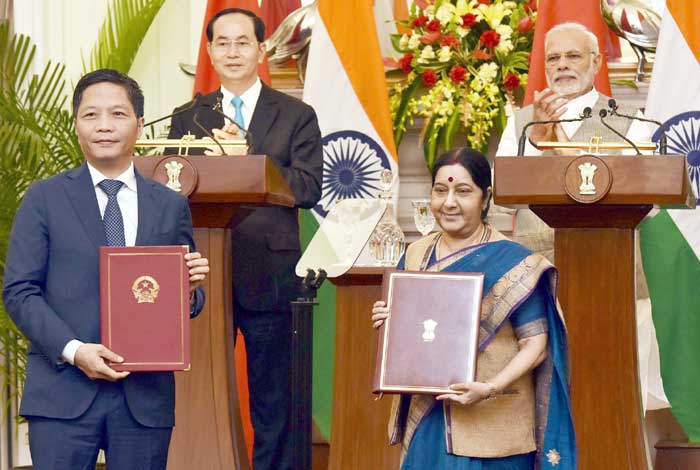
The Prime Minister Narendra Modi and the President of Vietnam Tran Dai Quang witnessing the exchange of agreements in New Delhi
The official visit made by the President of Vietnam Tran Dai Quang to India on 2-4 March 2018 marked one more significant milestone in the rapidly expanding bilateral partnership. It was the second high-level official visit from Vietnam within a brief span of five weeks. Vietnamese Prime Minister Nguyen Xuan Phuc was in Delhi on 26 January as one of the chief guests for the Republic Day parade along with other ASEAN heads.
India’s relations with Vietnam have been cordial, robust and deeply rooted in history. The two countries have just commemorated the forty fifth anniversary of their diplomatic relations and their partnership has converged on a wide spectrum of bilateral and regional interests especially in the post-cold war years.
Vietnam is regarded as a vital component in India’s “Act East” policy. Under the rubric of this policy, Prime Minister Narendra Modi has been making systematic efforts to deepen India’s economic and strategic engagements with the countries of the Indo-Pacific region. Since ASEAN forms the core area of India’s extended neighbourhood, its partnership with the group is of paramount importance. Within ASEAN, Vietnam has been a major focus of India’s eastern drive. It may be mentioned that it was Prime Minister Modi who infused a new dynamism in the bilateral relations at the time of his visit to Vietnam in 2016. In turn, Vietnam was the country coordinator for relations between ASEAN and India for three years from 2015-18 and it played a critical role during the New Delhi Commemorative conference in January this year.
Both Modi and Quang in their talks affirmed that security cooperation forms a very important pillar of the partnership. In fact, both countries have taken several steps even earlier for forging strong cooperation. As early as 2000, the two countries signed a protocol for defence cooperation. They followed it up by signing a joint declaration on the framework for comprehensive cooperation. In 2007, they forged a strategic partnership that underscored three areas- (a) cooperation indefence supplies, joint projects, and intelligence exchanges; (b) cooperation in capacity building, technical assistance and information sharing and (c) cooperation in counter terrorism. In 2015, both countries issued a Joint Vision Statement on defence cooperation which reiterated their commitment to enhancing the ongoing defence engagements including cooperation in the maritime domain. In 2016, both countries elevated their strategic relations to a “comprehensive strategic partnership” and Modi claimed that the upgradation would provide “a new direction, momentum and substance to our bilateral relations.”
The present Modi- Quang talks were focused on the following three important subjects- (a) defence and security cooperation; (b.) economic relations and (c )energy cooperation.
First, India reiterated its willingness to continue to assist Vietnam in defence production and in developing Vietnam’s defence capabilities, Both countries agreed to undertake speedy measures to implement India’s earlier pledge to extend $ 100 million credit for supplying high speed patrol ships for Vietnamese border guards. Likewise, both countries also agreed to speedily sign a framework agreement for implementing India’s $ 500 credit line for Vietnam’s defence industry. It should be noted that the above two credit lines were signed in 2015 and 2016, but action on them was delayed. It is good that both Modi and Quang have now agreed to operationalise them soon. In the meantime, one should note how Japan has enhanced its strategic cooperation with Hanoi and as part of that, it has also extended technology transfer to that country including supply of patrol vessels.
Both Modi and Quang have agreed to work together for an open, free and prosperous Indo-Pacific region where sovereignty and international laws are respected and where differences are resolved through dialogue. They also firmly reiterated their firm commitment to maintaining maritime security including freedom of navigation, and over-flight, settlement of maritime disputes on the basis of the U.N. Convention on the Law of the Sea.
Economic relations:Second, both Modi and Quang evinced keen interest in taking steps to enhance bilateral economic engagements. There is a strong belief that the economic potential of the partnership has not been fully utilized.Though India is among the top ten trading partners of Hanoi, thevolume of their bilateral trade hovers around only $ 8-9 billion which is far below the potential and needs to be boosted. Both countries have now decided to explore effective measures to achieve an annual target of $15 billion by 2020.
Similarly, efforts are being made to boost the two-way investment between India and Vietnam. At present, India’s investment in Vietnam is about $1 billion. It has about 168 projects engaged in a range of sectors including energy, mining agro-processing, IT and auto companies. A number of Indian firms including the Tata Group, Reliance, J.K. Tires and Glenmark Pharmaceuticals are very much involved in conducting their business. Are
Modi called on Vietnamese companies to take full advantage of India’s friendly investment climate under the ‘Make in India’ scheme. Likewise President Quang addressed the Forum of business leaders in India and called upon them to appreciate the numerous advantages and opportunities available in Vietnam for their business.
Energy: Vietnam has been long interested in getting India involved in some projects concerning oil and gas exploration in the South China Sea. But China has always strongly resisted any project in the SCS. Oil exploration in the SCS is a very sensitive question in Sino-Vietnamese relations. India has always asserted that its oil exploration in the SCS is a commercial engagement and not related to the maritime dispute. It remains to be seen what strategies both Modi and Quang will adopt to overcome the present impasse with China. Apart from the SCS, both India and Vietnam are also interested in oil and gas exploration projects in third countries.




